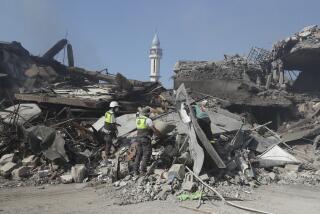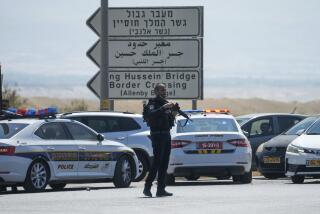Suicide Bomber Kills 3 Israelis in West Bank
ARIEL, West Bank — Everyone who saw him, it seemed, knew what the young Palestinian in telltale bulky garb intended to do as he walked through the gates of the West Bank’s second-largest Jewish settlement Sunday morning: the woman who screamed, “Suicide bomber!”; the gas station attendant who grabbed for him; the Israeli soldiers who rushed to tackle him.
But despite all that, the man’s bomb went off, killing three Israelis along with their assailant and injuring 20 others. The army later confirmed that all three of the Israeli dead and 10 of the injured were soldiers, including two who were severely wounded.
The Palestinian militant group Hamas claimed responsibility for the attack and said the bomber was a 22-year-old man from the northern West Bank city of Nablus. Initially, another Palestinian group, the Al Aqsa Martyrs Brigade, said it had dispatched the bomber, but it later withdrew its claim.
Sunday’s attack, the second deadly suicide bombing in this region in a week, came six days after 14 passengers died in a bus conflagration in northern Israel. It was also the second such strike in seven months at the same spot: the entrance to Ariel, a sprawling settlement of about 20,000 inhabitants set amid rocky terraced hills and olive groves 20 miles north of Jerusalem.
Large Jewish settlements like this one have the look of a prosperous American suburb, with neat red-roofed homes, careful landscaping and mini-malls. At Ariel’s entrance is a gas station, its overhang gaily striped in red, blue and yellow.
On Sundays, the adjoining cafeteria, just off one of the West Bank’s main highways, is usually bustling, full of Israeli soldiers on their way back to base after their weekend leaves. Sunday is the start of the workweek in Israel.
Witnesses’ accounts of what happened in the chaotic moments after the bomber was spotted about 11:30 a.m. differed in some details, but all agreed on key points: that soldiers rushed the man; that the gas station attendant and another man seized him and shouted that he was wearing an explosives-laden belt; that shots were fired, either by soldiers or other onlookers, striking the assailant; and that the bomb went off almost immediately after that, as he was pinned on the ground by several soldiers.
“I saw three soldiers sitting on someone, holding his arms and legs,” said Israel Werner, a 37-year-old security guard at a nearby supermarket who said he left Hollywood 16 years ago and emigrated to Israel. “I was [30 feet] away when all of a sudden there were two gunshots, and then the explosion.... I saw body parts flying in the air, and a ball of fire.”
The army said it was investigating whether shots fired at the bomber had detonated the device or whether the bomber had managed to set it off himself. He carried about 12 pounds of explosives strapped around his waist, authorities said.
Medics Arrive
The settlement has a sophisticated medical clinic, and paramedics were on the scene almost immediately. Yiftach Levy, a paramedic who was in the clinic’s intensive care unit, said he arrived less than a minute after the blast.
“We could see the injured scattered all around,” he said. The first person he tried to treat, a soldier with gaping chest and abdominal wounds, died as he was being worked on, he said. The gas station employee who had grappled with the bomber was seriously injured but was still alive hours later after surgery, doctors said.
Authorities said the attack could have been much worse.
“We were lucky it was in the open air,” Levy said. Bomb blasts in enclosed places typically claim a greater toll, as an explosion’s shock wave is magnified and victims suffer massive internal injuries as a result.
The attacker was about 30 yards from the station’s gas pumps when the bomb detonated -- “If he had gotten to there, the whole place would have blown up,” said Werner, the security guard.
Hours after the attack, Israeli soldiers shot and killed two Palestinian gunmen in Nablus, six miles to the northeast. The army said the soldiers were trying to arrest the men when they were fired on and fired back, but Palestinians described the two deaths as assassinations.
Nablus is under the control of the Israeli military, but curfews on its Palestinian population have been lifted intermittently. The curfew was eased Sunday morning so residents could shop for food, the army said.
Palestinian Shot Dead
Another Palestinian man -- described by the army as a gunman, though Palestinians said he was unarmed -- was shot dead in the northern West Bank city of Jenin.
Israeli troops took over Jenin early Friday, moving in with hundreds of troops and dozens of armored vehicles, after saying they had determined that a cell of the radical group Islamic Jihad operating there had been responsible for Tuesday’s bus bombing outside the northern Israeli town of Hadera.
Amid the latest violence, a political dispute over funding for Jewish settlements in the West Bank and Gaza Strip has been brewing in the government of Prime Minister Ariel Sharon. The center-left Labor Party, a partner in his coalition, has said it will vote against next year’s budget because it wants money that is earmarked for settlements to be devoted to welfare spending instead.
A preliminary parliamentary vote on the budget has been set for Wednesday, and the Labor ministers could defy Sharon and then either be dismissed by him or resign.
If Sharon’s coalition fell apart, elections would be called within 90 days.
However, shows of brinkmanship are common in Israeli politics, and a compromise could be struck before events come to that.
More to Read
Sign up for Essential California
The most important California stories and recommendations in your inbox every morning.
You may occasionally receive promotional content from the Los Angeles Times.










